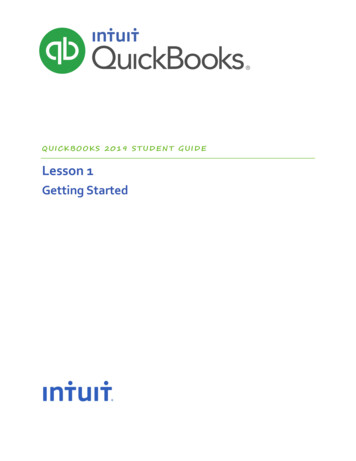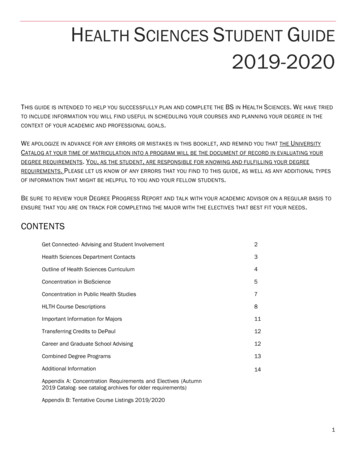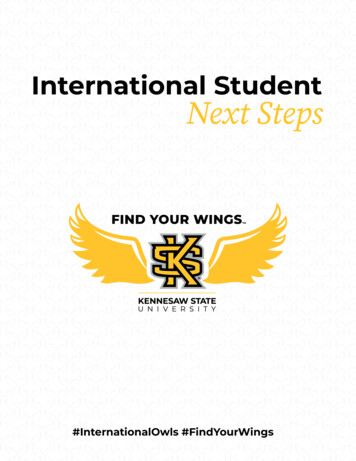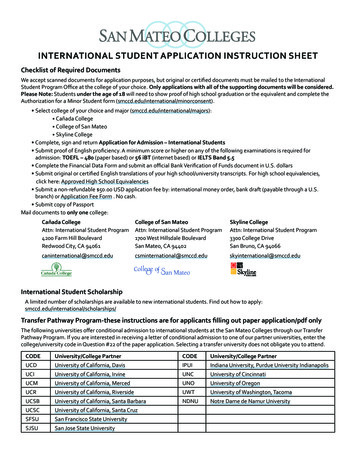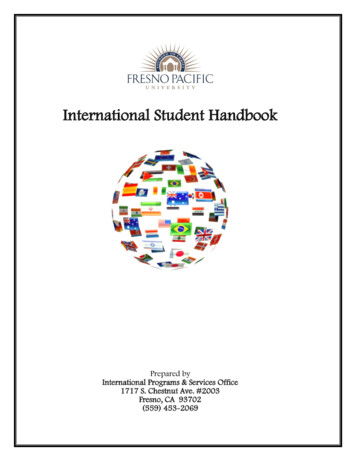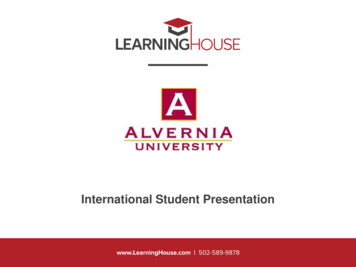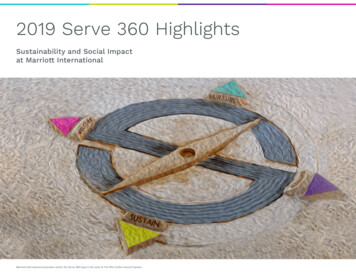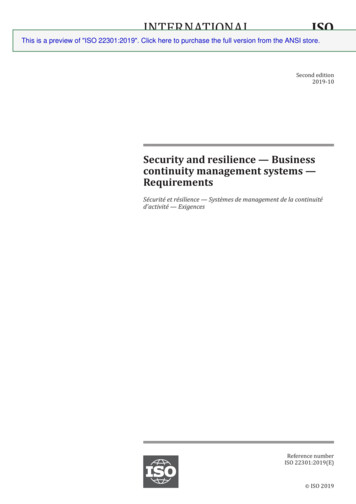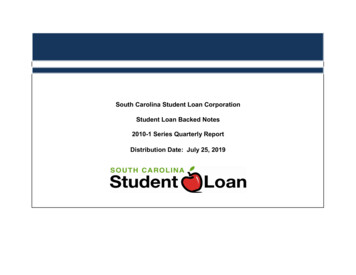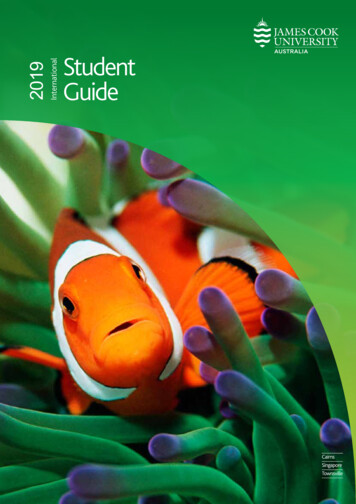
Transcription
International2019StudentGuide
WelcomeCongratulations on choosing James Cook University foryour studies in 2019.JCU is a leading Australian research and teachinginstitution where international students come tofurther their education, undertake research and gainqualifications that are recognised globally. We areparticularly proud of our reputation for excellence inproducing graduates who have a special understandingof the tropics. Our students are privileged to be taught byworld-leading academics and have real-life laboratorieson their doorstep including the Great Barrier Reef andDaintree Rainforest.During your time with us you will discover new ideas,issues, people and possibilities. You will leave with theexpertise and intellectual curiosity to make a differencein your chosen profession and community. Ourgraduates are valued by employers for their combinationof academic skills, practical experience and goodcommunication and technology skills.Students are at the heart of JCU and we understandit can be a big step to study so far from home. Withfriendly campuses, smaller class sizes, accessible teachingstaff, and excellent support services, JCU’s internationalstudents receive the personal attention needed toachieve their best and have a truly Australian experience.More than 6,000 international students from over 100countries are enjoying the benefits of studying with JCUright now. I hope that in this Guide, you discover thatJCU can provide you with the skills, teachers and facilitiesyou are looking for to ignite and support your passion forlearning.Professor Sandra HardingVice-Chancellor and PresidentA guide to this bookThis book contains everything you need to know to prepare for and participate in your study experienceat JCU. Make sure you read it thoroughly before you arrive and refer to it throughout your studies.What to expectLiving and studying abroad in Australia is a unique and exciting experience. You can expand yourhorizons, make lifelong friends and hopefully learn more about yourself. It is important to rememberthat things won’t always be easy. You may experience homesickness, culture shock and manyother challenges that come with a life-changing experience. In these situations, remember that theInternational Student Support Team is here to help you. Come and see us in the Student Centre or emailinternational@jcu.edu.au or cairnsinternational@jcu.edu.au.
ContentsBefore you arrive2About Townsville and Cairns3Top 10 things to do before you arrive4Visas5Organising your travel5Accommodation considerations8Family8Money and finances9Culture shock114 Things Successful Students Do Before They Arrive12Living in North Queensland13Lifestyle14Accommodation15Services: Telephones, Internet and Transport17Transport18Shopping19Money and finances19Health and medical services21Working in Australia24Safety: Beaches, sun, storms, animals and personal safety25Adjusting to life in Australia30Aussie Culture30Public holidays31Recreation: Nightlife, clubs, societies and organisations31Travel Destinations33Studying at JCU34Code of conduct35Top 10 things to do after you arrive35International Orientation, OWeek, Subject Enrolment35Types of Study, Timetables, Class Registration36Fees and charges37Managing your enrolment38Applying to graduate39Complaints and Grievances39Keys to success: Resources, English support and plagiarism40Exams and grading41Academic progression policy43Support services43Contacts44JAMES COOK UNIVERSITY – STUDENT GUIDE 20191
Before you arriveJAMES COOK UNIVERSITY – STUDENT GUIDE 20192
ABOUT TOWNSVILLE AND CAIRNSTownsvilleTownsville is Australia’s largest tropical city, with a population ofaround 190,000. It is located on the north-east coast of Australiain the dry tropics region of Queensland. The city boasts 300 daysof sunshine each year, and a variety of national sporting events,markets, cultural activities, and art galleries. The Whitsunday islands,West Savannahs and the real Australian outback are just shortdrives from the city. Townsville has a variety of sporting, cultural andentertainment options available.The Townsville campusOver 13,000 students, including over 1500 international studentscreate a lively atmosphere on our Townsville campus. The campus islocated in a setting of natural bush and parkland, just 13 kilometres(eight miles) from the city centre.10 Unforgettable Townsville andSurrounds Experiences Take a stroll down The Strand and enjoy the magnificentviews across Cleveland Bay to Magnetic Island Navigate your way around Magnetic Island on a Mini Moke Take a walk in the clouds at Paluma Range, one of the manylocal rainforests or cool off in the clear waters of Little or BigCrystal Creek Test your endurance and head up the Goat Track on CastleHill for a 360 degree panoramic view of the city Try North Queensland’s internationally acclaimed homegrown brew, Townsville Bitter at The Brewery Experience the atmosphere of a National Rugby LeagueCowboys home game at 1300 Smiles Stadium Put your dancing shoes on and rave all night at the famousfull moon parties at Base Backpackers, Magnetic Island Meet the ghosts of the Northern Queensland outbackGhost of Gold Heritage Trail, Charters Towers or stayovernight in a ‘haunted hotel room’ in Ravenswood Get up close and personal with Australian wildlife atBillabong Sanctuary, North Queensland’s interactivewildlife sanctuary.Need to know Currency: Australian dollars ( ) Language: English ATMs: In large cities and big towns Credit Cards: Visa and Master Card are widely accepted Visas: All visitors to Australia need a visa, exceptNew Zealanders. Check out homeaffairs.gov.au formore information Driving: drive on the left; the steering wheel is on the right Tipping: not required, you can tip 10% in restaurants ifyou’re happy with the serviceJAMES COOK UNIVERSITY – STUDENT GUIDE 20193
CairnsFun Facts Australia’s national colours are greenand gold Australia’s floral emblem is the wattle The animals on the Australian Coatof Arms are the Red Kangaroo andthe Emu. These animals were chosento symbolise a nation movingforward (as neither animal can walkbackwards!) Australia is the driest inhabitedcontinent on earth, with the leastamount of water in rivers, thelowest run-off and the smallest areaof permanent wetlands of all thecontinents. Australia is home to more than onemillion species of plants and animals,many of which are found nowhereelse in the world, and less than halfhave been described scientifically.As a popular tourist destination Cairns has over two millionvisitors each year who are attracted to the spectacularnatural environment and activities on offer. Recreationalactivities include scuba diving and snorkelling on the GreatBarrier Reef, and exploring ancient rainforests, waterfalls andnational parks. Cairns’ diverse population of around 165,000people enjoy a cosmopolitan lifestyle with many cafes,restaurants, markets and nightclubs.The Cairns campusOver 4200 students study at JCU Cairns, including over500 international students. The campus is surrounded byrainforestcovered mountains and is located near the popularnorthern beaches suburbs. It is just 15 kilometres (nine miles)north of Cairns city centre and the international airport.10 Unforgettable Cairns andSurrounds Experiences Take an underwater adventure and snorkel or dive theWorld Heritage listed Great Barrier ReefTop 10 things to do before youarrive at JCU1. Apply for a student visa – go to page 52. Make travel arrangements – go to page 53. Get to know the suburbs of Townsville or Cairns –go to page 14, 154. Explore accommodation options (on-campus or offcampus) – go to page 15, 165. Attend a JCU Webinar6. Check if you have outstanding conditions on youroffer and prepare to bring the documents with you7.Browse through the Australian Customs andQuarantine Services website to see what you can andcannot bring into Australia – go to page 68. Obtain a letter or prescription from your medicalpractitioner if you have any special medical conditionsor medications that you need to take through customs9. Provide your family and friends with your contactdetails in Australia10. Get your stuff ready! Experience the roar of the rapids by white-waterrafting on the Tully River, Australia’s best raftingdestination Skydive over Dunk Island or try an ocean kayak atMission Beach Tour through the ancient volcanic Tropical Tablelandsregion, where you can swim in beautiful crater lakes,visit picturesque waterfalls and even spot the veryelusive Platypus Experience the fabulous Cairns nightlife, fromshopping at the daily Cairns Night Markets and eatingand partying at funky bars and cafes Glide just meters above the rainforest canopy beforedescending through rainforest canopy layers and deepinto the heart of the Kuranda rainforest on the famousKuranda Skyrail Take a guided night walk, horse ride or swim in in atropical rock pool in Cape Tribulation, situated in theWorld Heritage Listed Daintree Rainforest Immerse yourself in the world’s oldest living culture andlearn about Aboriginal culture at the Tjapukai AborigionalCultural Park Take a cruise on Hartley’s Lagoon to see crocodiles intheir natural environment.JAMES COOK UNIVERSITY – STUDENT GUIDE 20194
VISASMost international students will requirea student visa to study in Australia. Someother visa holders are also eligible to studyas international students in Australia. Manystudents apply for a visa on-line or via theAustralian Diplomatic Mission in their country.In order to apply for a visa you will need avalid passport, an electronic Confirmationof Enrolment (eCoE) evidence of OverseasStudent Health Cover (OSHC) and any otherdocumentation required by the Australiandiplomatic post with which you lodge yourapplication.You must ensure to allow enough time forprocessing between lodging your applicationand the start of your academic program, asit may take some time to process. Averagevisa processing times can be found on theDepartment of Home Affairs website.How to apply for a Student VisaYou may be able to apply for a studentvisa online through the Department of HomeAffairs website.Visa ConditionsYou must hold a valid passport and studentvisa at all times while in Australia. It is yourresponsibility to ensure that your passportand student visa are current, and that youapply for any renewal before your passportor visa expires.If you are granted a visa, you must abide byits conditions. Failure to comply with theseconditions could result in the cancellation ofyour visa. JCU is obliged to report studentswho breach their student visa conditions tothe Department of Home Affairs. Theseconditions include (but are not limited to): Complete the course within the durationspecified in the CoE Maintain satisfactory academic progress Maintain approved Overseas StudentHealth Cover (OSHC) while in Australia Remain with the principal educationprovider for 6 calendar months, unlessissued a letter of release from the providerto attend another institution Notify your training provider of yourAustralian address and any subsequentchanges of address within 7 daysImportant: If your online application islodged when you are outside Australia, youmust also be outside Australia before the visacan be granted. Refunds are not available ifyou enter Australia on another type of visabefore your online application has beendecided. Work restrictions depending on the visasubclass you hold. Check the Departmentof Home Affairs website for moreinformation.You should complete your application withas much information as possible at timeof lodgement. Applications with missinginformation may take longer to finalise.Be aware of your visa end date, this enddate will be indicated on your visa grantdocumentation. Alternatively you can viewyour visa date and conditions using VisaEntitlement Verification Online (VEVO).Please make plans to leave Australia beforethe end date of your student visa. If you havenot finished your studies by the end datelisted on your CoE you will need to apply for anew CoE and a new student visa.Helpful links: Student visa information List of Australian embassies andrepresentative officesJCU Staff cannot provide visa advice.For information on Australian visamatters please visit the Department ofHome Affairs websitehomeaffairs.gov.au or phone131 881.ORGANISING YOUR TRAVELYou will need to make your own travelarrangements to Australia. Please tryto arrive a few days before the start of thecompulsory International StudentOrientation to allow you enough time tosettle in.Key dates throughout semester includingthe International Student Orientation andOrientation Week can be found online.Students studying at the Townsvillecampus are strongly recommended to flyinto Townsville, as it is a five hour drivefrom Cairns or 16 hour drive from Brisbane.DocumentsYou should prepare a folder of officialdocuments to bring with you to Australia,including: Valid passport Copy of your visa grant letter JCU Letter of OfferA full list of mandatory student visaconditions can be found online. Confirmation of Enrolment (eCoE) issuedby JCU Receipts of payments (e.g. tuition fees,OSHC, bank statements etc.) Insurance policies Original or certified copies of youracademic transcripts and qualifications Other personal identification documents,e.g. birth certificate, ID card, driver’s licence Medical records and/or prescriptionsJAMES COOK UNIVERSITY – STUDENT GUIDE 20195
If you have a permanent or temporarydisability and need special studyconditions or support services, see whatdocumentation you will need to bringwith you. Contact our Accessibility team forfurther information: Townsville: accessability.tsv@jcu.edu.au Cairns: accessability.cns@jcu.edu.auIf you are travelling with your family you willneed to include their documents as well. Keepall documents in your carry-on luggage. Incase you lose the originals, make copies thatcan be left behind with family or scan andemail copies to your email address.What to bringAustralian Customs Services and quarantineare very strict. Before you start packing, visitthe Department of Agriculture webpagefor information on what you cannot bringinto Australia. Also read about what can’tbe mailed into Australia and let friends andfamily know.If you’re in doubt about whether your goodsare prohibited or not, declare it anyway onthe Incoming Passenger Card which you willreceive on the plane. Students have receivedfines for not declaring items.Baggage allowances flying into Australia willvary according to your carrier, flight classand country of origin. Please check whatbaggage allowances your airline has and thinkcarefully about what you are going to pack.Economy passengers are generally permitted1 x checked luggage (35kg) and 1 x carry-on(7kg) for international flights, but only 20kgof checked luggage on domestic flights withinAustralia. You will be able to purchase mostthings upon arrival in Australia but the pricemay be higher than in your own country.Bringing Medications into AustraliaMedicines brought into and taken outof Australia may be subject to customscontrols. You can bring some medicationsinto Australia for the purpose of treatingyour own medical condition or treating apassenger who is under your care; providedthat you have a prescription or a letter fromyour doctor to confirm that the medicine wasprescribed by a medical practitioner.Ensure that the maximum amount ofmedicine you bring is equivalent to 3months’ supply.Some medications are prohibited frombeing brought into Australia unless you holda permit. You can find a list of prohibitedmedication on the Theraputic GoodsAdministration.To find out how to apply for a permit contactthe Therapeutic Goods Administration.What if I run out of medication while I amin Australia?If the medication you require is a prohibitedimport, you cannot import additionalquantities by mail. You should consult a localdoctor. If the medication is not approved inAustralia and there is no suitable alternative,a local doctor may be authorised to importthe medication on your behalf.ClothesPeople from other countries may chooseto wear their national dress. Townsville andCairns students usually dress informally;shorts and t-shirts are considered standardwear. Bring some loose, comfortable clothesfor the warmer months, and light winterclothing for the cooler months. You may haveone or a few formal occasions throughoutyour stay so bring along formal attire. Forfestive occasions, you may want to bringtraditional dress and accessories. umbrellainsect repellentscientific or graphics calculatorcameramicro recorder for lecturesspare spectacles or contact lensesyour optical prescriptionphotos of friends and familyswimming suitsmall gifts from homeelectricity adaptorEthernet CableThe standard voltage for electrical items inAustralia is 240V. Electric plugs have threeflat pins one of which is an earth pin. Youmay need to buy an adaptor or have theplugs changed when you arrive. If the itemruns on 110V power it may be cheaper topurchase a new item rather than an adapter.Mobile Phones & LaptopsYou can bring items such as a laptopcomputer, and similar electronic equipment,duty free into Australia provided thatCustoms is satisfied these items are intendedto be taken with you on departure. For moreinformation visit Australian Customs andBorder Protection Service.If you are considering bringing a mobilephone, laptop, or any communicationdevices we suggest that you visit theAustralian Communications and MediaAuthority at acma.gov.au before making anypurchases.Thongs aroundthe world Australia: ThongsNew Zealand: JandlesSouth Africa: Slops or PlakkiesHawaii: SlippersSouth Pacific: Go – AheadsUK: Flip Flops?Will my mobile phonework in Australia?Other items you might need to include(most can also be purchased in Australia) alarm clocksunscreen, sunglasses and a hatbath towels, bed sheets, pillow casesdictionary (bilingual)small sewing kitmusic CDs or iPodtoiletriesAustralian mobile phone networksoperate on the GSM 900 / 1800frequency bands. You should checkyour phones instruction booklet orcall the phone supplier to see if yourhandset is compatible. If your phone ismarketed as ‘GSM’, ‘tri-band’ or ‘quadband’ there is a good chance that it willwork. You also need to ensure that yourphone is not carrier locked if you wantto use it with an Australian SIM card.JAMES COOK UNIVERSITY – STUDENT GUIDE 20196
Your arrivalBefore landing in Australia passengers aregiven an Incoming Passenger Card to fillin. This is a legal document. You must tickü YES if you are carrying any food, plantmaterial including wooden souvenirs, oranimal products. This includes fruit given toyou during your flight. If you have items youdon’t wish to declare, you can dispose thesein quarantine bins in the airport terminal.Don’t be afraid to ask airline staff if you haveany questions.If you are carrying more than AU 10,000in cash, you must also declare this on yourIncoming Passenger Card. It is stronglyrecommended however, that you do notcarry large sums of cash but arrange for anelectronic transfer of funds into your Australianbank account once it has been opened.When you first arrive in Australia you willbe required to make your way throughAustralian Immigration. An ImmigrationOfficer will check your documents and mayask you a few questions about your plansfor your stay in Australia. Once you havepassed through the immigration checks youwill move to baggage claim to collect yourluggage. Check that nothing is missing ordamaged. Staff at the Baggage Counter willhelp you to find your belongings or lodge aclaim for damage or loss.You may see a quarantine detector dog at thebaggage carousel or while waiting in line topass through immigration. Do not touch thedog and follow any instructions asked of youby the quarantine officer.Once you have your luggage you will gothrough Customs. Be careful about whatyou bring into Australi
International Student Support Team is here to help you. Come and see us in the Student Centre or email international@jcu.edu.au or cairnsinternational@jcu.edu.au. JAMES COOK UNIVERSITY – STUDENT G
